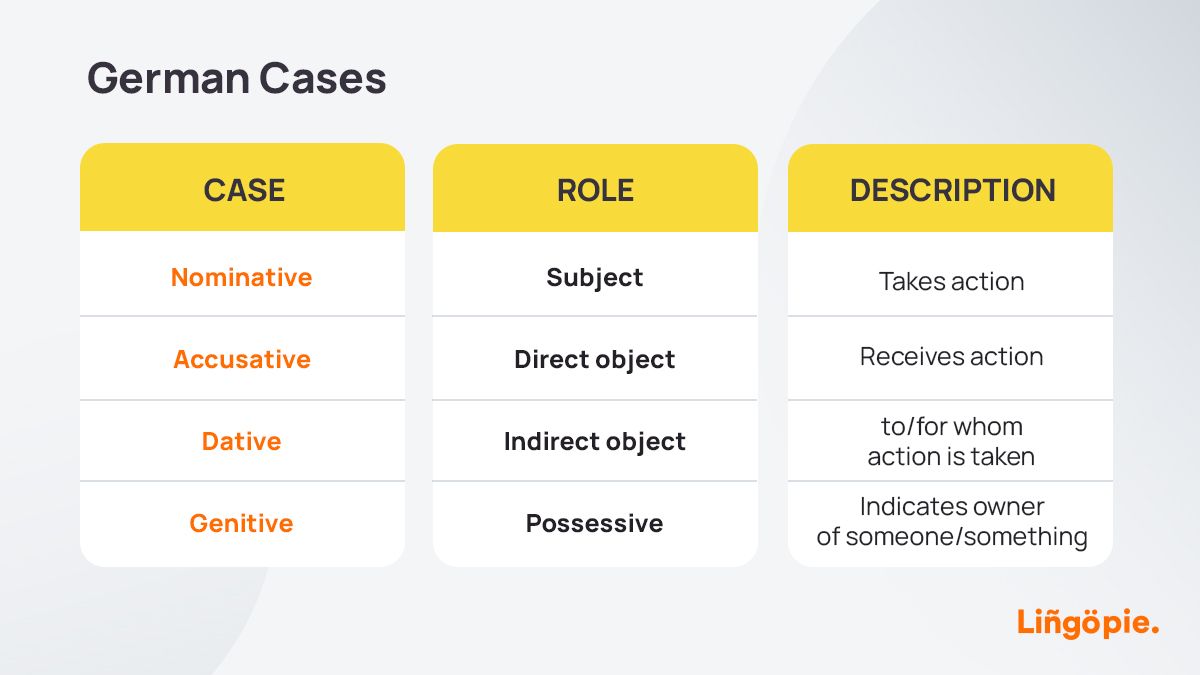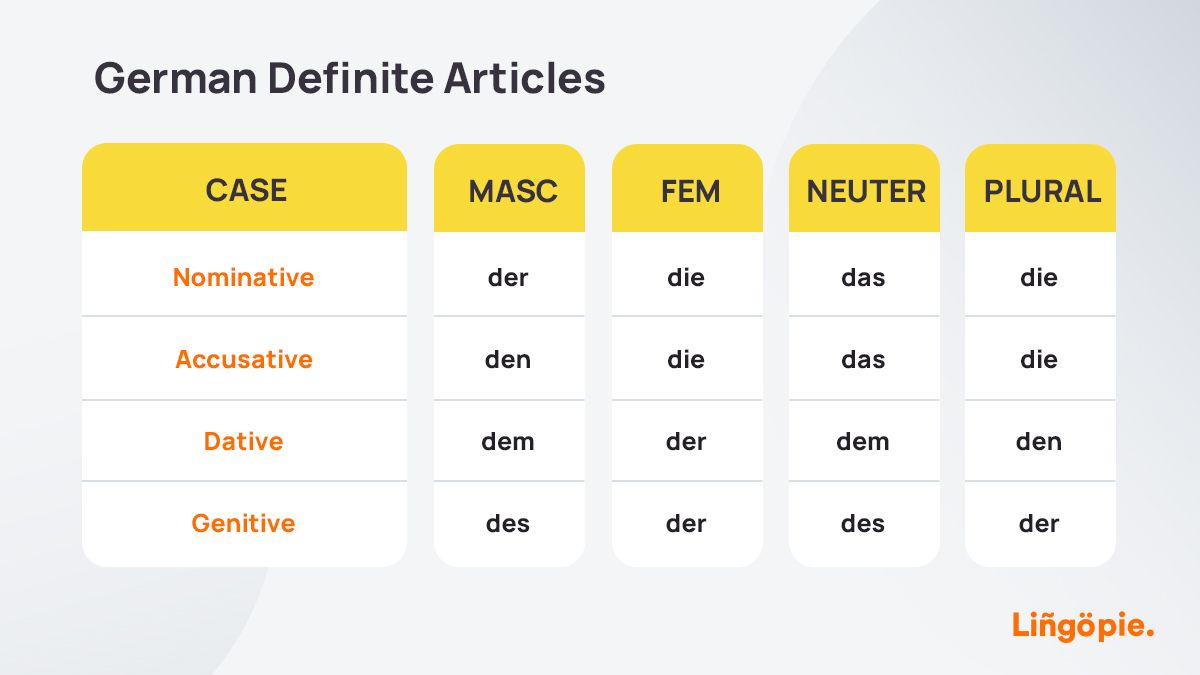Welcome to our brief guide to the Kasus/Fall or German case system. Here, we will briefly introduce the German cases: the nominative case, the accusative case, the dative case, and the genitive case.
We will explain what German cases are, give examples of each, and provide guidance to help you to identify which German case to use and when.
By the end of this guide to German cases, you will understand gendered nouns and articles and how they interact with cases to form sentences. Moreover, we will look at prepositions commonly used in each German case.
If you're just at the beginning of your German learning journey this might all sound overwhelming, but stay with us and we will guide you through this German grammar point until you are confident and comfortable with the four German cases.
Related: The Best Way to Learn German as a Beginner

The Basics Of The German Grammar
Alright, before we get into the nitty-gritty of the German case system, we need to go over a couple of grammar rules first - nouns and prepositions. These two are going to be super important for understanding how cases work.
German Nouns
This means every noun (person, place, or thing), such as pilot, hospital, and sandwich, has a gender and must have the correct corresponding article.
However, there are several ways to say "the" (definite article) and "a" (indefinite article) in German, depending on which case is being used.
To use the correct definite and indefinite articles and German cases, you must be able to identify when a noun is a subject, direct object, indirect object, or possessive noun in a sentence.
All German nouns are capitalized, not only proper nouns.
Prepositions in German
Prepositions are words that express the role played by the nouns in a sentence.
For example:
- The cup is on the table/ She falls into the pool/ The baby is with his dad
Unfortunately, in German, they are a little complex due to the four German cases.
When we use a preposition, the noun or pronoun that follows must be in the case associated with that preposition.
Now that you understand both, let's go over the more complex point of the German case system.
What Is The German Case System?
In German, words take different endings or forms depending on whether they are the subject, direct object, indirect object, or possessor. These different forms are called "cases." There are four cases in German:
- Nominative case - Nominativ
- Accusative case - Akkusativ
- Genitive case - Genitiv
- Dative case - Dativ
Understanding the cases is an essential factor when you are learning to speak German as they will determine the meaning of your sentences and inform your listening comprehension.

One major difference between English and German is how they handle cases. In English, we mainly rely on word order to convey meaning, while German uses a system of case endings and declensions.
How Cases Work In English
English has a very limited case system compared to German. We primarily distinguish between the subjective case (I, he, she, they) and the objective case (me, him, her, them) for pronouns. For nouns, there is really only the possessive case marked with "'s".
The role of a noun phrase, whether it's the subject, object, etc., is determined almost entirely by its position and word order in the sentence. For example:
- "John hit the ball."
- "The ball hit John."
Simply changing the word order completely alters the meaning and who is the subject and object. In the first sentence, "John" is the subject who hit "the ball" which is the object. In the second sentence, their roles are reversed.
This rigid word order in English is necessary because of our lack of case markings. Without it, sentences would be ambiguous.
How Cases Work In German
Unlike English, German does not rely heavily on word order to convey meaning. Instead, German uses a system of four cases: nominative, accusative, dative, and genitive.
The case of a noun determines its role in the sentence - whether it is the subject (nominative), direct object (accusative), indirect object (dative), or shows possession (genitive).
The case is indicated by changing the noun's ending as well as the endings on the articles, adjectives, and other words accompanying the noun. Thesechangeable endings are called declensions.
For example, let's look at the German word "Stein" meaning "stone":
- Nominative: der Stein (the stone - subject)
- Accusative: den Stein (the stone - direct object)
- Dative: dem Stein (to/for the stone - indirect object)
- Genitive: des Steines (of the stone - possession)
So "der Stein" is the subject form, while "den Stein" is used when "stone" is the direct object receiving the action. However, this inflected case system adds complexity. The exact declension depends on the noun's gender (masculine, feminine, neuter), whether it's singular or plural, and which case it's in.
What Are The 4 Cases In German?
The Nominative Case: The Subject
The German nominative case describes the subject of a sentence, which is the person or thing performing the action of the verb. The definite and indefinite articles in the nominative case are in their most basic form:
- Masculine "the"/ "a" - der/ ein
- Feminine "the"/ "a" - die/ eine
- Neuter "the"/ "a" - das/ ein
- Plural "the" - die
Definite articles translate as "the" ("der", "die" and "das").
Indefinite articles, the "ein" words, translate to "a(n)". There is no plural nominative indefinite article listed, as we do not say "a puppies", for example.
Remember that articles change as we move through the German cases. We will see this in more detail below.
When using the nominative case, the subject of the sentence, such as the woman (die Frau), the man (der Mann), or the house (das Haus), takes the article of the correct gender as it appears in the nominative case.
Look at the following example sentences:
- Eine/ Die Frau lebt in Deutschland - A/ the woman lives in Germany
- The woman ("die Frau") is the subject of this sentence in the nominative case.
- Ein/ Der Mann arbeitet im Laden - A/ the man works in the store
- Ein/ Das Haus ist in Berlin - A/ the house is in Berlin
While masculine and neuter nouns both use “ein” in the nominative case, and feminine and plural nouns both use “die”, you will be able to differentiate the meaning from the noun endings.
For example:
- Die Frau - The woman
- Die Frauen - The women

The Accusative Case: The Direct Object
The accusative case, or what is called the objective case in English, describes the direct object of a sentence (the thing the subject acts upon).
Only the masculine articles change in the accusative case, while all other articles remain the same:
- Masculine "the"/ "a" - den, einen
- Feminine "the"/ "a" die, eine
- Neuter "the"/ "a" das, ein
- Plural "the" die
In the sentence "the child eats an apple", the child is the subject and the apple is the direct object.
The apple is the thing that the subject acts upon. Let's take this example sentence:
- Das Kind isst einen Apfel
The apple ("den Apfel") is the direct object.
It is a singular and masculine noun and is in the accusative case.
Therefore, it takes the article einen in this sentence (or den for "the").
Direct objects work slightly different in German than in English, in that they can move around the verb and still mean the same thing.
This is because the case will determine which noun is the subject and which is the direct object. In English, this is determined by the word order.
For example, in English "the dog loves the cat" has a different meaning than "the cat loves the dog".
However, in German, we can switch the nouns and it will still mean "the dog loves the cat".
- Der Hund liebt die Katze = Die Katze liebt der Hund
The dog is the subject of this sentence in the nominative case ("der Hund"), regardless of the word order.
If you want to say “the cat loves the dog”, you would say:
Die Katze liebt den Hund
The dog is the direct object of this sentence in the accusative case ("den Hund").
Common accusative propositions:
- Durch - Through
- Ohne - Without
- Gegen - Against
- Für - For
- Um - Around
So, when you use one of these prepositions, the noun's article must also be in the accusative case.
For example:
- Ich laufe durch den Park - I run through the park
- Wir hüpfen um einen Baum herum- We skip around a tree

The Dative Case: The Indirect Object
The dative case describes the indirect object of a sentence, which usually receives an action from the direct object (in the accusative case). As with the accusative case, word order in the dative case is flexible. As long as you use the correct case, the meaning is clear.
Articles in the dative case look like this:
- Masculine "to the"/ "to a" - dem/ einem
- Feminine "to the"/ "to a" - der/ einer
- Neuter "to the"/ "to a" - dem/ einem
- Plural "to the" - den
This is the first time we have seen the definite article change for plural nouns.
The dative plural form has an "n" ending. Some people find the dative endings challenging, however, the masculine and neuter articles are the same, which helps.
- Ich gebe dem Mann ein Buch - I give the man a book
The man is the indirect object of this sentence in the dative case, so "der Mann" becomes "dem Mann".
- Sie kauft ihm ein Geschenk - She gives him a present
"Him" (ihm) is the indirect object of this sentence. See the section on personal pronouns below. These, too, are different across the German cases.
Common Dative Prepositions
- Aus - From/out of
- Außer - Except for/ besides
- Bei - At/ near/ with
- Mit - With/by
- Nach - After/ to
- Seit - Since (time)/ for
- Von - By/ from
- Zu - At/ to
For example:
- Sie kommt aus der Türkei - She comes from Turkey
- Wir haben einen Brief von ihnen bekommen - We got a letter from them
You might recognise the dative preposition "von" from German surnames.
It means "from" and traditionally indicated nobility, like the English "of".
For instance, Anne of Cleves (Anna von Kleve, in German).
Common Accusative or Dative Prepositions
- An - At/ alongside
- Auf - On/ on top of
- Hinter - Behind
- In - In
- Neben - Beside/ next to
- Über - Over
- Unter - Under
- Vor - In front of
- Zwischen - Between
When you use a verb of movement, such as gehen (to go) or laufen (to run), and the preposition refers to a destination, you must use the accusative case.
For example:
- Wir gehen heute in die Schule - We are going to school today
When a static verb is used, like sein (to be) or arbeiten (to work) and the preposition refers to a location, you must use the dative case.
- Ist es unter der Platte? - Is it under the plate?
Understanding this grammar rule will ensure you use the correct case with each of these two-way prepositions.

The Genitive Case: The Possessive
The basic concept of the genitive case is linking two nouns where one possesses the other. In English, we tend to indicate possession by adding an apostrophe "s".
For instance "the man's book".
The German genitive case makes it easy by only using – es and – er endings.
Masculine and neuter nouns and pronouns take the – es ending, while plural and feminine nouns and pronouns use the – er ending.
- Masculine "the"/ "a" - des, eines
- Feminine "the"/ "a" - der, einer
- Neuter "the"/ "a" - des, eines
- Plural "the" - der
For example:
- Das Buch des Mannes - The man's book
- Die Handtasche einer Frau - A woman's purse
The noun in the genitive case follows the noun that it modifies.
In the first example, "the man" is the noun in the genitive case and it follows "the book".
The man modifies the book as it denotes ownership of the book.

Common Genitive Prepositions
Recently, the German genitive case has been used less frequently because often the dative case can be used instead.
However, some genitive prepositions are useful in everyday speech. Here are some examples:
- Anstatt/statt - Instead of
- Außerhalb - Outside of
- Innerhalb - Inside of
- Trotz - Despite
- Während - During
- Wegen - Because of
For example: - Trotz des Schnees gehen wir zur Party - Despite the snow, we are going to the party
- Anstatt der Schuhe habe ich die Stiefel gekauft - Instead of shoes, I bought the boots
German Cases And Personal Pronouns
Another aspect of German cases that we will touch on lightly is personal pronouns and how they change depending on which case is being used.
In English, we have personal pronouns that indicate when someone is the subject of the sentence (I, you, he, she, it, we, they).
Moreover, there are personal pronouns for when the person is not the subject of the sentence (me, you, him, her, it, us, them).
It can be tough for native English speakers to know when to use accusative or dative case pronouns, as they both translate the same in English (me, you, him, her, it, us, them). This is a separate lesson for another day!
German Verbs And Adjectives
There are also certain verbs that need to use specific cases in German, for instance, sagen (“to say” is always a dative verb. Moreover, German adjectives will change their endings depending on the case being used.
Frequently Asked Questions
Why does German have four cases?
The German language has cases because it explicitly marks the grammatical function of nouns and allows for flexible word order. By declining nouns with specific endings for each case, their role in the sentence is clear regardless of their position. This frees German from relying on a strict word order like subject-verb-object that English uses to convey meaning.
When to use case in German?
In German, you must use the appropriate case every time you use a noun, pronoun, or adjective modifying a noun. Cases govern how these words decline (change their endings) based on their grammatical function in a sentence. The four cases are:
- Nominative - Used for the subject of a sentence/clause
- Accusative - Used for the direct object of a sentence
- Dative - Used for the indirect object of a sentence
- Genitive - Used to show possession or associate nouns
Remember, failure to use the right case will result in grammatically incorrect and likely incomprehensible statements. So we highly recommend mastering the German cases.
Are German cases hard?
Yes, German cases are considered quite difficult for English speakers to master due to the complex system of declensions that nouns, pronouns, and adjectives must follow based on gender, number, and case.
Why are German cases important?
Cases are extremely important in German because they indicate the role each noun plays in a sentence by changing word endings. Proper case usage is mandatory for grammatically correct and clear communication.
Learn The German Language At Home
This quick guide to the German cases is just a starting point from which you can build your understanding of the German language in more detail.
A fun way to immerse yourself in German and speed up the process of learning German cases and vocabulary is streaming German TV on Lingopie.
This is a great platform designed to help language learners develop their foreign language skills and comprehension through binge-watching entertaining shows.
You can test your knowledge of the four cases (nominative, accusative, dative, genitive) by streaming German TV and listening for their uses.
Hearing spoken language is the perfect way to learn grammar authentically.
If you want tips on what to watch head over to our 10 German Shows on Netflix to Help You Learn German and Top 20 German Movies and Series to Learn German articles and start binge watching!
Summing Up: A Guide to German Cases
This has been a brief guide to understanding German cases.
We have learned that word order in German is not as important as in English, and the German cases determine the subject and (in)direct object of a sentence instead.
On top of this, we have seen some common prepositions that are used in each of the German cases and touched on personal pronouns.
For more resources and inspiration to learn German cases, vocab and grammar, head over to Lingopie and start binge-watching German language shows.




![Learn French with Video: Our Top 10 Movies In French [Movie Tips]](/blog/content/images/2022/10/10-top-french.webp)
![How to Learn Korean with Money Heist: Korea – Joint Economic Area [Free Guide]](/blog/content/images/size/w1200/2022/08/money-heist-korea.png)



